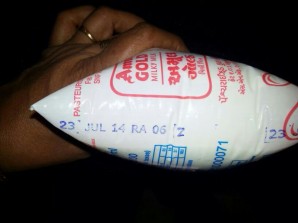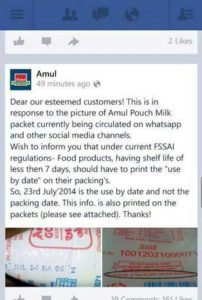
Clarification by Amul on a WhatsApp image of Amul Gold milk pouch opens a can of worms; Is FSSAI in-cahoots with Amul in cheating consumers?
Hardeep Singh Bedi
NEW DELHI: An image of Amul, a major Indian dairy brand, milk pouch being circulated on WhatsApp and other social media channels on Monday forced the company to post a clarification on Facebook. However, the clarification has put the company in wrong side of the law. For, Amul is milking and befooling Indian consumers by flouting the regulations of Food Safety and Standards Authority of India (FSSAI). Amul is an Indian dairy cooperative, based at Anand in the state of Gujarat, India.
It all started on 21 July, 2014 with an image of Amul Gold milk pouch bearing date 23 Jul 14 on the seal area. The message that was being circulated on WhatsApp with the Amul milk pouch read: “Today is 21 July, 2014 but this milk was packed on 23 July, 2014!! Think how fresh this milk could be?”
The image spread like a fire in the jungle and when it reached up to Amul, the company posted a clarification on its Facebook page, with the WhatsApp image and an additional image, that read: “Dear our esteemed customers! This is in response to the picture of Amul Pouch Milk packet currently being circulated on whatsapp and other social media channels.
Wish to inform you that under current FSSAI regulations- Food products, having shelf life of less then 7 days, should have to print the “use by date” on their packing’s.
So, 23rd July’2014 is the use by date and not the packing date. This info. is also printed on the packets (please see attached). Thanks!”
The attached photo with this post shows a packet of Amul milk on which an area is circled that read: “For Batch no. & “Use by date” see seal/stamp area”
The company didn’t provide any hyperlink or uploaded any file to back its claim that “under current FSSAI regulations- Food products, having shelf life of less than 7 days, should have to print the “use by date” on their packings”
However, company’s clarification made it clear that Amul has been giving information on its milk packets that is not required and has not been declaring the information that is required.
Clause 8 (Lot/Code/Batch identification) of the Food Safety and Standards Authority of India Notification dated the 1st August, 2011, says: “A batch number or code number or lot number which is a mark of identification by which the food can be traced in the manufacture and identified in the distribution, shall be given on the label. Provided that in case of packages containing bread and milk including sterilised milk, particulars under this clause shall not be required to be given on the label.”
Therefore, the company is not required to give batch number on its milk packets. However, Amul is not doing what it is supposed to do under FSSAI regulations.
Clause 9 (Date of manufacture or packing) of the Food Safety and Standards Authority of India Notification dated the 1st August, 2011, says: “The date, month and year in which the commodity is manufactured, packed or pre-packed, shall be given on the label: Provided that the month and the year of manufacture, packing or pre-packing shall be given if the “Best Before Date” of the products is more than three months: Provided further that in case any package contains commodity which has a short shelf life of less than three months, the date, month and year in which the commodity is manufactured or prepared or pre-packed shall be mentioned on the label.”
Amul doesn’t print date of manufacture or packing on its milk packets. As per the company’s Facebook post, the date on Amul milk packets is actually the use by date and not the packing date. So, going by Amul’s claims and FSSAI notification it can be construed that the shelf life of Amul milk is more than three months!
Now, the ball is in the court of Amul and FSSAI and they should come up the supportive documents to prove that (i) milk packets need to have batch number printed, (ii) only ‘Use by Date’ is required to be printed on milk packets not the ‘Date of manufacture or Packing’, and (iii) the above Gazette Notification is wrong.
If it can’t be done then a serious question arises: Is FSSAI in-cahoots with Amul in cheating consumers? It is the Right of consumers to know how old milk is being supplied to them by Amul or other dairy product companies.


